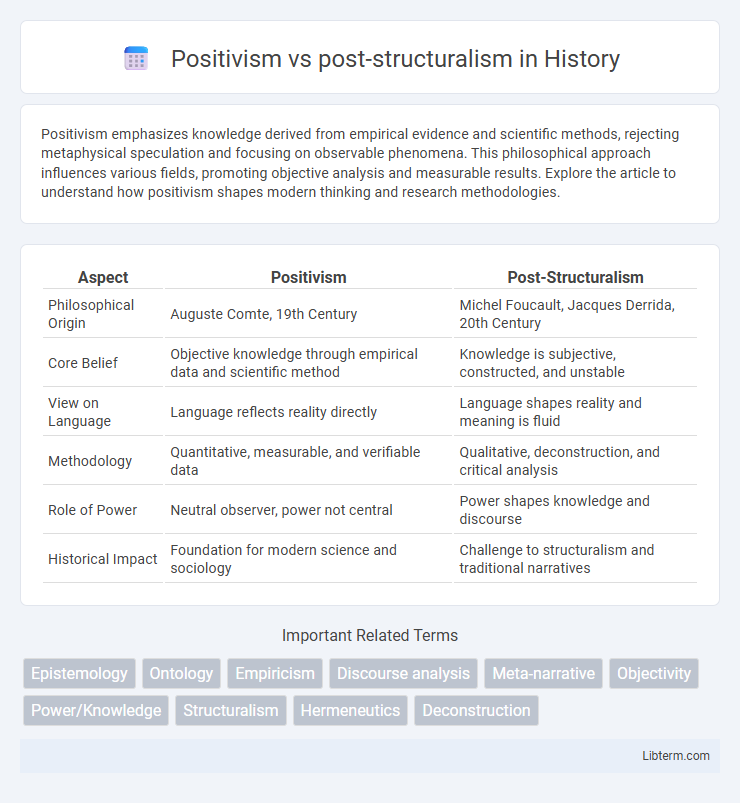Positivism emphasizes knowledge derived from empirical evidence and scientific methods, rejecting metaphysical speculation and focusing on observable phenomena. This philosophical approach influences various fields, promoting objective analysis and measurable results. Explore the article to understand how positivism shapes modern thinking and research methodologies.
Table of Comparison
| Aspect | Positivism | Post-Structuralism |
|---|---|---|
| Philosophical Origin | Auguste Comte, 19th Century | Michel Foucault, Jacques Derrida, 20th Century |
| Core Belief | Objective knowledge through empirical data and scientific method | Knowledge is subjective, constructed, and unstable |
| View on Language | Language reflects reality directly | Language shapes reality and meaning is fluid |
| Methodology | Quantitative, measurable, and verifiable data | Qualitative, deconstruction, and critical analysis |
| Role of Power | Neutral observer, power not central | Power shapes knowledge and discourse |
| Historical Impact | Foundation for modern science and sociology | Challenge to structuralism and traditional narratives |
Introduction to Positivism and Post-structuralism
Positivism emphasizes empirical observation, scientific methods, and objective knowledge, asserting that reality can be understood through measurable data and logical analysis. Post-structuralism challenges these fixed meanings and universal truths by highlighting the fluidity of language, power structures, and the subjective nature of knowledge construction. While positivism seeks certainty through observable facts, post-structuralism embraces ambiguity and the deconstruction of established frameworks.
Historical Background of Positivism
Positivism emerged in the early 19th century, primarily developed by Auguste Comte, as a philosophy grounded in empiricism and the scientific method, emphasizing observable, measurable facts. It arose during the Industrial Revolution, reflecting the era's confidence in progress, science, and rationality to understand and organize society. Positivism fundamentally influenced the development of social sciences by promoting objective, systematic approaches to studying social phenomena.
Origins and Development of Post-structuralism
Post-structuralism emerged in the 1960s as a reaction to the rigid frameworks of positivism, challenging its emphasis on objective knowledge and empirical verification. Rooted in the works of French philosophers such as Michel Foucault, Jacques Derrida, and Roland Barthes, post-structuralism develops through critiques of structuralism and emphasizes the fluidity of meaning, the instability of language, and the influence of power relations in knowledge production. This movement reshapes epistemology by rejecting fixed truths, promoting interpretative pluralism, and highlighting the role of discourse in constructing reality.
Core Principles of Positivism
Positivism centers around the belief that knowledge should be derived from observable, empirical evidence and scientific methods, emphasizing objectivity and quantifiable data. It posits that social phenomena can be studied similarly to natural sciences, relying on measurable facts and logical analysis. This framework rejects metaphysical speculation, advocating for clear, testable hypotheses and a strict separation between facts and values.
Key Concepts in Post-structuralist Thought
Post-structuralist thought challenges the fixed meanings and objective truths emphasized in Positivism, highlighting concepts like deconstruction, power/knowledge, and subjectivity. It argues that meaning is fluid, contingent on context, and constructed through language and social practices rather than inherent or discoverable by empirical methods. Key theorists such as Michel Foucault and Jacques Derrida emphasize the instability of meanings, the role of discourse in shaping reality, and the decentralization of the subject.
Methodological Differences: Positivism vs Post-structuralism
Positivism emphasizes empirical observation and quantifiable data, employing scientific methods to produce objective and generalizable knowledge. Post-structuralism challenges the notion of fixed truths, using deconstruction and critical analysis to reveal the fluidity of meaning and subjectivity in texts and social phenomena. The methodological divergence lies in positivism's search for universal laws versus post-structuralism's focus on contextual interpretation and the instability of meaning.
Influence on Social Sciences and Humanities
Positivism, emphasizing empirical observation and scientific methodology, significantly shaped early social sciences by promoting quantifiable data and objective analysis, influencing fields such as sociology and psychology. Post-structuralism challenged these foundations by questioning fixed meanings and universal truths, inspiring critical approaches in humanities and social sciences that focus on power dynamics, language, and subjectivity. This shift led to interdisciplinary methodologies that prioritize context, discourse analysis, and the deconstruction of dominant narratives within cultural and social research.
Critiques and Limitations of Positivism
Positivism faces criticism for its strict reliance on empirical data and scientific methods, which many argue oversimplifies complex social phenomena and ignores subjective experiences. Critics highlight its limitations in addressing power dynamics, language, and cultural contexts, areas extensively explored by post-structuralism, which challenges the notion of absolute truths and fixed meanings. This epistemological rigidity restricts positivism's ability to interpret diverse human behaviors and social constructs effectively.
Criticisms and Debates Surrounding Post-structuralism
Post-structuralism faces criticism for its perceived relativism, which challenges the objective truths upheld by positivism and leads to debates over the stability of meaning and knowledge claims. Critics argue that post-structuralism's skepticism toward grand narratives and fixed structures undermines the possibility of universal knowledge, complicating scientific and social inquiry. The ongoing debate centers on whether post-structuralism's emphasis on language, power, and subjectivity enhances critical analysis or fosters intellectual uncertainty.
Contemporary Relevance and Future Directions
Positivism emphasizes empirical data and observable phenomena as the foundation of knowledge, maintaining relevance in scientific research and data-driven policy making. Post-structuralism challenges fixed meanings and embraces interpretive plurality, influencing contemporary fields such as cultural studies, critical theory, and digital humanities. Future directions involve integrating positivist rigor with post-structuralist reflexivity to address complex social phenomena and evolving epistemologies.
Positivism Infographic

 libterm.com
libterm.com